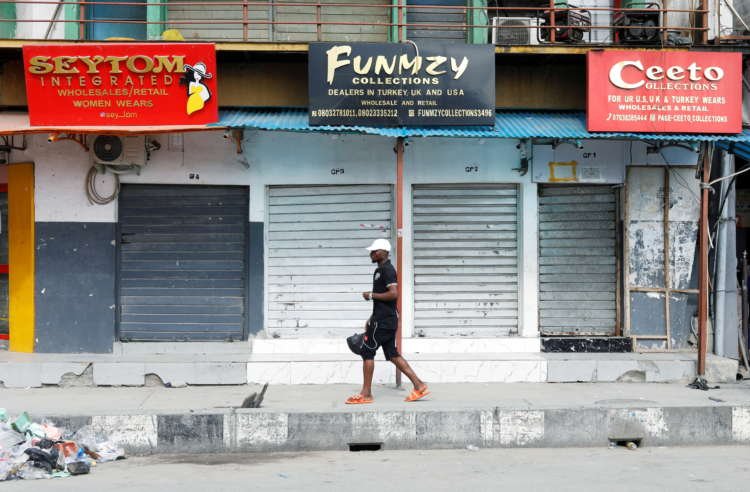As COVID-19 fuels youth unemployment, Nigeria doles out jobs
Published by linker 5
Posted on January 27, 2021
5 min readLast updated: January 21, 2026

Published by linker 5
Posted on January 27, 2021
5 min readLast updated: January 21, 2026

By Adaobi Tricia Nwaubani
ABUJA (Thomson Reuters Foundation) – From hotels and schools to the navy and police force, Nigerian graduate Ene Adejo has looked for a job just about everywhere since she finished her studies eight years ago, but she is still unemployed.
“Sometimes they tell me the course I studied doesn’t relate to the job I’m applying for … Sometimes they tell me I don’t have experience,” Adejo, 34, who studied adult education and business studies, said from her home in the capital, Abuja.
The COVID-19 pandemic has fueled youth unemployment in Africa’s largest economy, which has risen for five consecutive years to about 14%, prompting the government to launch a huge public works scheme to create jobs.
About 750,000 young unemployed people will be offered three-month placements with a monthly salary of 20,000 naira ($51) under the Special Public Works (SPW) programme.
While Adejo is not keen on the low-skilled jobs on offer, such as traffic control and road maintenance, she plans to apply anyway.
“I just don’t like being idle,” she said.
Nearly 14 million young people are out of work in Nigeria, which has one of the world’s largest youth populations, with more than a third of its 200 million people aged 24 or under, according to United Nations’ data.
While such numbers help explain government concern to tackle youth unemployment, critics say the SPW programme fails to address structural problems in the country, where oil wealth has enriched a small elite but failed to create employment.
“It’s a laudable idea but it’s like a drop in the ocean. It isn’t going to solve any problem. It’s just a short-term measure,” said Abiodun Folawewo, a professor of economics at the University of Ibadan in southwestern Nigeria.
Governments should not be providing jobs, he said, rather fostering the right conditions for businesses to thrive, in turn increasing labour demand.
“Once those things are in place, then jobs will be created. It is because those things are lacking that the government is doing this.”
FIGHTING POVERTY
Even proponents of state-led job creation initiatives have expressed scepticism about the SPW, which was launched by President Muhammadu Buhari earlier this month.
Obadiah Mailafia, a former deputy central bank governor who has called for some sort of mass employment scheme, said investment in major infrastructure projects was the key to providing long-term, highly skilled employment.
“I don’t find this particularly inspiring because public works schemes are far more than just casual works placements,” he said.
“Public works systems are about building railways networks, highways, mass housing, and getting lots of youth employed in those projects,” Mailafia, who ran for president against Buhari in a 2019 election, told the Thomson Reuters Foundation.
But Labour Minister of State Festus Keyamo said the jobs scheme was an emergency measure aimed at helping as many people as possible in tandem with longer-term economic stimulus and infrastructure efforts.
“In the now, while government is doing that, how will they survive?” said Keyamo, who is leading the programme.
“While government is creating an enabling environment, the government sees a way to even lift a few people, give a few people something in the immediate. Government’s approach to fighting poverty is multifaceted,” he said.
He added that the government was considering extending the scheme beyond three months, making it an annual affair, or turning it into an agricultural programme.
‘I JUST KEEP APPLYING’
Keyamo said the scheme targets the lowest socioeconomic class with little education, but that will do little to help the millions of well-educated young Nigerians classed as underemployed – working part-time or under-using their skills.
Nigeria’s rate of youth underemployment is 28.6%, according to the Nigerian Bureau of Statistics.
Nancy Otokina, who has a masters in business administration, has worked for less than two years in total since she graduated from university in 2009. Even going back to study for her masters failed to get her a lasting job.
“I thought it would improve my prospects. That was actually my main aim of doing it,” said Otokina, 35, who has a five-year-old son.
She has held off having another child in the hope she can find a job first.
“I just keep applying and applying,” she said.
Besides questioning the short-term focus of the SPW programme, some critics including Mailafia and Folawewo said they feared the government would use it as a means of rewarding supporters of the ruling All Progressives Congress (APC) party.
Keyamo rejected such criticism, saying stringent measures have been put in place to make the selection process transparent and free from political bias.
While Adejo waits to see what will come of her application, she has been helping out with administrative work at her church on a voluntary basis – trying to make ends meet by reselling household goods on social media.
She said she remained hopeful that her job search would bear fruit eventually: “I still expect that I’ll get a good job. My dream is to join the military or the police.”
(Reporting by Adaobi Tricia Nwaubani; Editing by Helen Popper; Please credit the Thomson Reuters Foundation, the charitable arm of Thomson Reuters, that covers the lives of people around the world who struggle to live freely or fairly. Visit http://news.trust.org)
Explore more articles in the Business category











